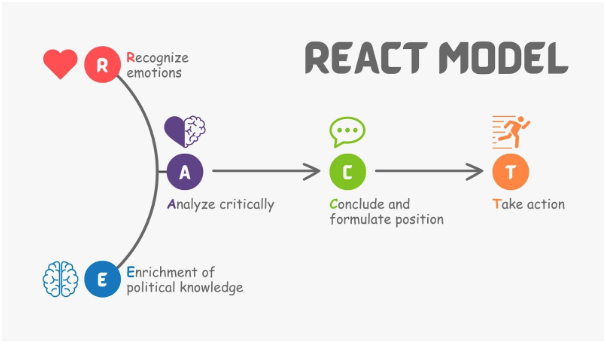Our Vision
Why Political Education in Times of Crisis?
Over two thousand years ago, Aristotle stated that human beings are political by nature. His idea holds true at all times, but it becomes especially relevant during periods of crisis. Especially when society is polarized and opinions are extreme, we need more than ever to develop critical thinking and understand that reality is complex. Only if we understand the complexity of society and reality can we make informed decisions and avoid simplistic solutions that could harm the future of the state and society.
In an era of turbulent emotions, fake news, and pressure to conform to a uniform opinion, political education serves as a compass to navigate the way. It helps us distinguish between facts and opinions, analyze social reality in depth, identify power relationships between groups, understand which groups have influence and what interests drive them to lead decisions affecting the collective. In short, incorporating and making political education accessible in the classroom is a way to prepare young people to be knowledgeable citizens with understanding and ideas to act and influence the reality around us.
True, it’s not simple. One needs to know how to navigate between emotions and critical thinking, and how to create a safe space to discuss controversial topics. But this is precisely the opportunity – to raise a new generation for whom it will be natural to engage in democratic, open, and respectful discourse even when it’s difficult, and to understand that it’s okay and even desirable for different opinions to exist.
This website is designed to allow us all to delve into the ideas and practices of political education, from learning about research in the field to translating them into day-to-day school life.

The Researchers

Keren Ketko Ayali
Oranim Academic College of Education
Expert in activist pedagogy for advancing active citizenship. A faculty member at Oranim College, she leads the didactics team in the secondary education teacher training program. Her research focuses on political education and civic media literacy. With a background in high school teaching and educational leadership, she has developed innovative curricula and leads teacher communities for social change. She is also the co-host of the podcast “Democracy Begins with Education”, and the founder of the civic platform “Shared Living.” Previously, she served as a community center director and as a supervisor in the Ministry of Education’s Society and Youth Administration.
Expert in activist pedagogy for advancing active citizenship. A faculty member at Oranim College, she leads the didactics team in the secondary education teacher training program. Her research focuses on political education and civic media literacy. With a background in high school teaching and educational leadership, she has developed innovative curricula and leads teacher communities for social change. She is also the co-host of the podcast “Democracy Begins with Education”, and the founder of the civic platform “Shared Living.” Previously, she served as a community center director and as a supervisor in the Ministry of Education’s Society and Youth Administration.

Adar Cohen
School of Education, Hebrew University of Jerusalem
Head of the Department of Teaching Studies at the Hebrew University’s School of Education and a senior lecturer in teacher training. Formerly the National Supervisor for Citizenship Education at the Ministry of Education and Director of the Center for Civic Education and Shared Living. He has taught civics in schools in Jerusalem and Holon and lectured at institutions such as the Kerem Institute and David Yellin College. His academic and professional focus includes civic and political education, teaching controversial issues in schools, and addressing extremist and racist expressions in the classroom.
Head of the Department of Teaching Studies at the Hebrew University’s School of Education and a senior lecturer in teacher training. Formerly the National Supervisor for Citizenship Education at the Ministry of Education and Director of the Center for Civic Education and Shared Living. He has taught civics in schools in Jerusalem and Holon and lectured at institutions such as the Kerem Institute and David Yellin College. His academic and professional focus includes civic and political education, teaching controversial issues in schools, and addressing extremist and racist expressions in the classroom.

Nir Michaeli
Oranim Academic College of Education
Senior lecturer at Oranim College and Pedagogical Director of the Council for State-Hebrew Education. He previously served as Rector of Oranim College and as Chair of the Ministry of Education’s Pedagogical Secretariat. He was among the founders of the Hashkafa (Leading Teachers) initiative and has held leadership positions at Kibbutzim College, the Kerem Institute, and the Branco Weiss Institute. He is a graduate of the Mandel School for Educational Leadership. His areas of expertise include education policy, informal pedagogy, and teacher education.
Senior lecturer at Oranim College and Pedagogical Director of the Council for State-Hebrew Education. He previously served as Rector of Oranim College and as Chair of the Ministry of Education’s Pedagogical Secretariat. He was among the founders of the Hashkafa (Leading Teachers) initiative and has held leadership positions at Kibbutzim College, the Kerem Institute, and the Branco Weiss Institute. He is a graduate of the Mandel School for Educational Leadership. His areas of expertise include education policy, informal pedagogy, and teacher education.

R – Recognize emotions
Recognize emotions and understand their role in the process of political education
E – Enrich
Enrich political knowledge as a necessary cognitive foundation for understanding complex political realities.
A – Analyze
Analyze critically and develop skills for interpretation and evaluation.
C – Conclude
Conclude and articulate positions based on evidence, while developing a political-civic identity through the integration of personal and collective perspectives.
T – Take action
Take action by fostering responsible activism through engagement and participation in the public sphere.
R – Recognize emotions
Recognize emotions and understand their role in the process of political education
E – Enrich
Enrich political knowledge as a necessary cognitive foundation for understanding complex political realities
A – Analyze
Analyze critically and develop skills for interpretation and evaluation
C – Conclude
Conclude and articulate positions based on evidence, while developing a political-civic identity through the integration of personal and collective perspectives
T – Take action
Take action by fostering responsible activism through engagement and participation in the public sphere
The Research
How Can We Teach Politics in Times of Crisis?
After the events of October 7 and during the “Swords of Iron” war, we sought to understand what happens in classrooms where teachers take a political or activist approach to education. As part of this research, we interviewed 48 public school teachers from across Israel who identified as political educators or as teachers who apply activist pedagogy in their work.
We listened to their stories—their dilemmas, challenges, and successes. Some had formal training in political education; others were guided by experience, passion, and intuition.
What did we learn? First, we identified five core principles that form the foundation of political education, based on both our analysis and existing literature:
- A strong knowledge base is essential—understanding political and social concepts matters.
- Emotions must be acknowledged—they are an integral part of political learning.
- Together, knowledge and emotion enable critical thinking.
- From this, civic identity can be developed—who we are as citizens, what we believe, and how we see our roles.
- And finally: the capacity to take responsible action and engage meaningfully with reality.
We didn’t stop at theory. Based on these insights, we created a practical model called REACT—a five-stage framework that supports teachers in navigating political topics in the classroom. From this model, we also developed a “toolbox for the journey”: classroom practices, activities, and teaching ideas.
Our most important finding? That it is not only possible but essential to talk about politics in the classroom—especially during times of crisis. Doing so helps cultivate critical thinking, active engagement, and the democratic values our society depends on.
Teaching Tools and Practices

Emotionally Aware Political Teaching
Development of an approach from SEL program in classrooms to SPEL education


Politibus

Political Discourse Cards
Teaching Tools and Practices

Emotionally Aware Political Teaching
Development of an approach from SEL program in classrooms to SPEL education


Politibus
